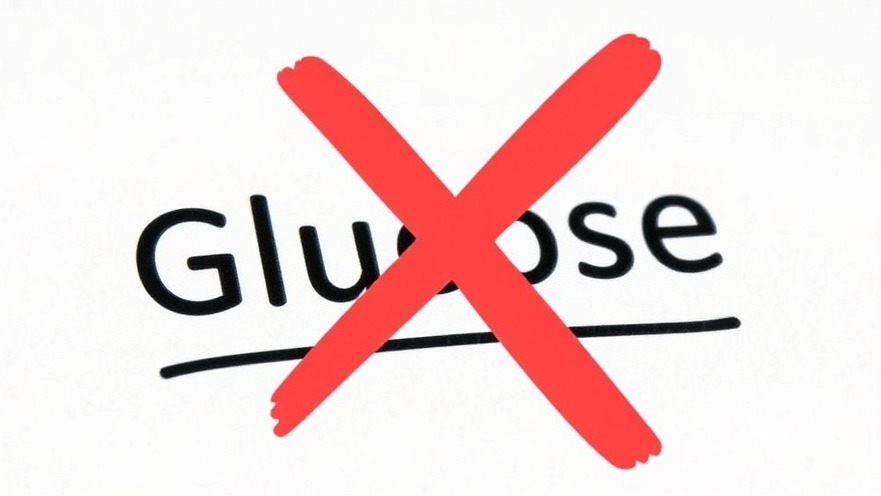
Uncovering the Truth: Is Glucose Really the Body's Preferred Fuel?
In recent discussions about health and nutrition, a significant claim has surfaced: that glucose, often perceived as the body's go-to energy source, may actually be the root cause of numerous chronic diseases. This notion, that glucose is essential for our survival, has permeated educational institutions worldwide, fostering a general belief that carbohydrates should constitute a large share of our diet. However, emerging insights push us to reconsider this long-standing assertion.
In 'This ONE Lie Causes 90% of Chronic Disease,' the video delves into the pervasive myth surrounding glucose as a beneficial energy source, prompting a deeper analysis of its actual effects on health.
The Evolutionary Perspective on Energy Sources
From an evolutionary standpoint, our ancestors relied primarily on fats and proteins, not the abundant sugars we find in today's diets. Paleo, or “caveman” diets, emphasize this point—our ancestors likely survived on what they could hunt and gather, which included a low intake of carbohydrates. In stark contrast, the typical modern diet overemphasizes carbohydrates, leading to a consistent high blood sugar level that our bodies can't effectively handle. The excess glucose is rapidly converted into fat, suggesting that while glucose may provide quick energy, it’s not meant to be the body’s primary fuel.
Understanding Insulin Resistance: A Growing Concern
Chief among the concerns associated with chronic glucose exposure is insulin resistance. As glucose levels spike, the pancreas is compelled to release more insulin to manage these surges. Over time, the body's cells lose sensitivity to insulin, leading to persistent high blood sugar levels. This period of elevated sugar can manifest in various symptoms: frequent urination, brain fog, and mood fluctuations, which are often dismissed as routine complaints.
Obscured by Commercial Interests: The Sugar Industry's Role
One must ask—why has glucose been labeled as the primary energy source, despite evidence suggesting otherwise? Our dependency on glucose can, in part, be attributed to powerful industry lobbyists who promote sugary products and lobby against dietary guidelines that emphasize low sugar intake. By perpetuating the myth of glucose as beneficial, they maintain a cycle of consumption that ultimately impacts public health.
The Benefits of Low-Carb Diets
Interestingly, evidence suggests that reducing carbohydrate intake can lead to remarkable health improvements. For instance, studies show that individuals on low-carb diets saw up to a 90% success rate in no longer requiring insulin in just ten weeks. Transitioning to a diet rich in healthy fats and proteins allows the body to utilize ketones, an alternative energy source that supports cognitive function more efficiently than glucose.
Long-Term Effects of High Blood Sugar
Moreover, the long-term consequences of continuous high glucose levels are alarming. Conditions such as type 2 diabetes, dementia (often referred to as type 3 diabetes), and various eye problems have been linked to the chronic elevation of blood sugar. This connection highlights the devastating effects that excessive sugar consumption can have, not only leading to immediate health complications but also contributing to chronic diseases over the years.
Waking Up from the Sugar Coma
As many of us navigate our daily lives, we often overlook the subtle signs that something might be wrong—especially with our dietary choices. Cognitive health is crucial, particularly as we age, and the effects of excess sugar can hinder our mental sharpness. Factors like memory issues and mood disorders often appear, stemming from the very diet we believe to be healthy.
Taking Charge of Your Health: Natural Remedies and Mindfulness
For those eager to explore the nuances of their diets and improve overall wellness, adopting habits like mindfulness exercises, balanced nutrition, and physical activity can be pivotal. Practicing yoga, engaging in tai chi, and exploring herbal remedies may not just aid in managing anxiety but also assist in better sleep hygiene and cognitive health, particularly for seniors. Tools like guided imagery, relaxation techniques, and herbal teas can enhance mental clarity and resilience during later life.
Conclusion: The Path Forward
The message of the original video resonates deeply in a world where chronic diseases are steadily rising. As we delve into the implications of sugar's impact on our health, it becomes clear that understanding our dietary choices is essential. Take control of your health today: explore the benefits of a low-carb lifestyle and discover how natural approaches can effectively enhance your well-being.
 Add Element
Add Element  Add Row
Add Row 



Write A Comment